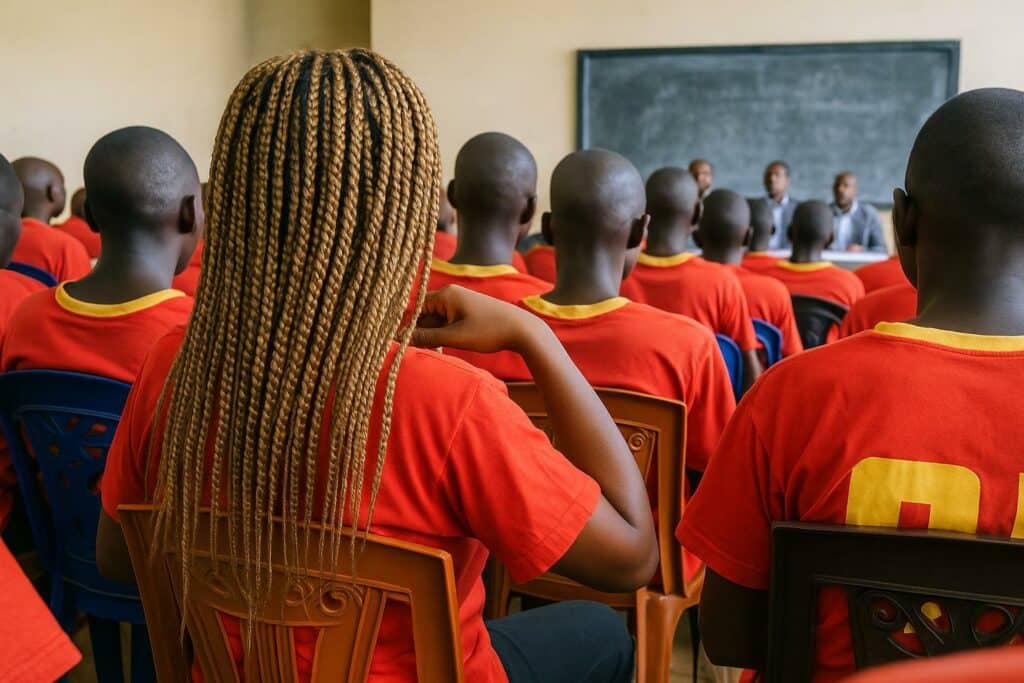Academic Triumph Behind Bars
The iron gates of Brazzaville’s Maison d’arrêt et de correction momentarily receded into the background on 20 September, as the courtyard filled with applause rather than the familiar clank of cell doors. Nineteen detainees, including fourteen candidates for the Baccalauréat d’enseignement général, received official certificates attesting their success in the June 2025 state examinations. Their achievements crown a pedagogical programme launched in 2017 that has progressively turned the penitentiary into an unexpected, if modest, centre of learning.
This year’s results—ten passes out of eleven entrants for the Certificat d’études primaires élémentaires, ten out of ten at the BEPC and fourteen successes at the baccalauréat—translate into a pass rate hovering near one hundred per cent. They surpass last year’s already promising figures and give material substance to the national priority accorded to youth for the biennium 2024-2025 as proclaimed by President Denis Sassou Nguesso.
A Rallying Call for Clemency
Buoyed by their grades, the baccalaureate laureates addressed the Director-General of the Penitentiary Administration, Colonel-Major Jean Blaise Komo, with a carefully worded petition. “In the hope of continuing our education,” one spokesman declared, “we respectfully request release, so that our reintegration may start with university admission and the building of tomorrow’s Congo.” The reference to the presidential declaration on youth framed the request within the broader national agenda rather than as a purely individual plea.
Colonel-Major Komo, speaking on behalf of the Keeper of the Seals, praised the determination required to study in a carceral environment where improvised desks compete with the echo of daily roll calls. He reminded the graduates that the baccalaureate is the first university credential, opening doors to the Université Marien-Ngouabi and the Université Denis-Sassou-Nguesso. While stopping short of promising immediate freedom, he encouraged them to maintain academic discipline pending the competent authorities’ examination of their plea.
Government’s Rehabilitation Strategy
The ceremony was not limited to parchment and speeches. Boxes of textbooks, exercise notebooks and chalk boards were unloaded, signalling the administration’s intention to transform this year’s success into a durable trend. Colonel-Major Komo articulated the objective with clarity: “Ninety-seven per cent is an honour, but one hundred per cent must be our horizon. Prison is not an end in itself; when inmates leave, they must be equipped to re-enter society.”
Such language aligns with the penitentiary administration’s statutory mission of rehabilitation. By facilitating education within prison walls, the Ministry of Justice and Human Rights seeks to reduce recidivism, foster social cohesion and cultivate a pool of skilled youth capable of contributing to national development. Parents of the inmates in attendance echoed this view, thanking the government for “support that proves prison is not synonymous with failure.”
From Classroom to Campus: What Lies Ahead
For the graduates, the path from the prison classroom to a university amphitheatre remains contingent upon an act of clemency. Should presidential mercy be granted, they would join the next intake at public universities early in 2026, in disciplines ranging from law to agronomy depending on their individual grade sheets. In the interim, distance-learning modules and preparatory courses are being organised inside the facility to keep academic momentum alive.
Correctional educators caution, however, that logistical hurdles abound. Identity documents must be updated, judicial requisites completed and scholarship applications filed—tasks more cumbersome behind bars. The penitentiary administration is therefore coordinating with the Ministry of Higher Education to streamline registration once legal conditions permit.
Legal and Socio-Economic Perspective
Under Congolese law, presidential pardon constitutes a discretionary act grounded in Article 80 of the Constitution and implemented through decrees published in the official gazette. Precedent shows that educational merit can weigh favourably, especially when public safety considerations are minimal and restitution obligations have been met. The present request will thus be evaluated on a case-by-case basis by the competent judicial committee before submission to the Head of State.
Economists meanwhile highlight the cost-benefit calculus of post-carceral education. Studies within the region have associated every additional year of schooling with a measurable increase in earning capacity, thereby lowering the public expenditure linked to repeat offences. If the current cohort eventually secures gainful employment, the symbolic effect on remaining inmates could act as a multiplier, reinforcing the penitentiary’s rehabilitative ethos.
À retenir : the 2025 examination results mark the first formal ceremony in which the Brazzaville prison has handed over state diplomas to its inmates. Le point juridique / éco : a potential presidential decree could convert academic success into conditional freedom, turning education into both a legal argument and an economic asset for national development.

